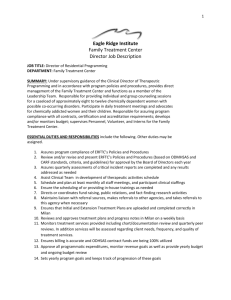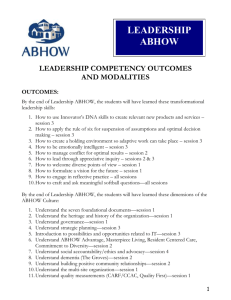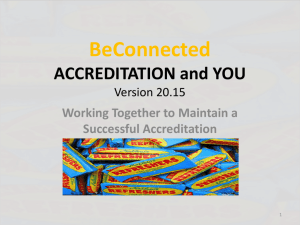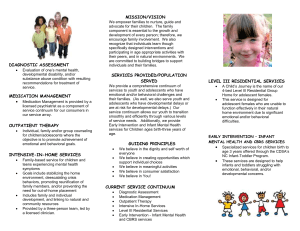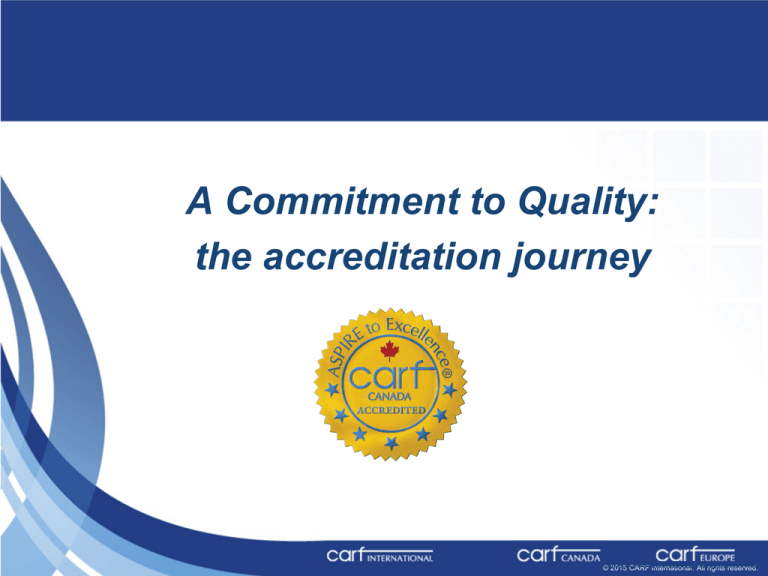
A Commitment to Quality:
the accreditation journey
©
All rights
rights reserved.
reserved.
© 2013
2015 CARF
CARF International.
International. All
Presenters
• Rajeev Mohindru,
MSW, BSW, RSW, B.Com, B.Tec, DMS
Director of Care
•Dan Stavert,
MSW, BSW, RSW
Chief Advisor
© 2015 CARF International. All rights reserved.
© 2015 CARF International. All rights reserved.
STRAW POLL
Raise your hand if….
your organization is accredited.
© 2015 CARF International. All rights reserved.
© 2015 CARF International. All rights reserved.
STRAW POLL
Raise your hand if….
you are very familiar with accreditation.
© 2015 CARF International. All rights reserved.
© 2015 CARF International. All rights reserved.
STRAW POLL
Raise your hand if…..
the thought of accrediting your
organization gives you nightmares.
© 2015 CARF International. All rights reserved.
© 2015 CARF International. All rights reserved.
Overview of Session
•
•
•
•
•
•
•
•
About CARF
The accreditation process
Standards
About PICS
Why seek accreditation?
Selecting an accreditor
Learnings and outcomes
Benefits of accreditation
© 2015 CARF International. All rights reserved.
© 2015 CARF International. All rights reserved.
CARF International Group
© 2015 CARF International. All rights reserved.
© 2015 CARF International. All rights reserved.
About CARF
CARF
• Commission on Accreditation
of Rehabilitation Facilities
Status
• Non-profit
• Independent
Programs
• Health and human services
© 2015 CARF International. All rights reserved.
© 2015 CARF International. All rights reserved.
Programs
• Aging Services
• Behavioural Health
• Business & Services Network Management
• Child & Youth Services
• Employment & Community Services
• Medical Rehabilitation
• Vision Rehabilitation
© 2015 CARF International. All rights reserved.
© 2015 CARF International. All rights reserved.
CARF Quick Facts
Founded in
1966
First
Canadian
survey in
1969
6,800+
service
providers with
more than
50,000
accredited
programs
Incorporated
in 2002
More than 8 million
persons served
annually by CARFaccredited orgs
Offices in
Edmonton
&
Toronto
480+ service
providers
with more
than 3,800
accredited
programs
© 2015 CARF International. All rights reserved.
© 2015 CARF International. All rights reserved.
Mission
The mission of CARF is to promote
the quality, value, and optimal outcomes
of services through a consultative
accreditation process and continuous
improvement services that centre on
enhancing the lives of persons served.
© 2015 CARF International. All rights reserved.
© 2015 CARF International. All rights reserved.
CARF’s Primary Business
The CARF seal of accreditation
signifies that a provider focuses on the
needs of the persons served and
demonstrates commitment to
continuously improving service quality.
© 2015 CARF International. All rights reserved.
© 2015 CARF International. All rights reserved.
Recognition of CARF in Canada
British Columbia's Ministry of Children and Family Development (MCFD) and
Community Living British Columbia (CLBC) have approved CARF accreditation
for both contracted community living agencies and child, youth, and family services.
Alberta Ministry of Health recognizes CARF as an accepted accrediting organization
for Alberta’s health system, including seniors care, mental health, and addictions.
Alberta Ministry of Human Services recognizes CARF for contracted child, youth,
and family services and for contracted providers of services to persons with
developmental disabilities.
Ontario Ministry of Health and Long-Term Care recognizes CARF accreditation for
long-term care homes and provides a funding premium to accredited homes.
Ontario’s Community Care Access Centres (CCACs) recognize CARF Canada as
a choice for accreditation of both CCACs and contracted service providers.
Ontario’s Mississauga-Halton and Central West Local Health Integration Networks
(LHINS) recognize CARF Canada accreditation for LHIN-funded agencies.
Ontario Association of Residences Treating Youth (OARTY) lists CARF Canada
as an accreditation option for its member agencies.
© 2015 CARF International. All rights reserved.
© 2015 CARF International. All rights reserved.
Residential Care in BC
“Accreditation is an external peer review process to assess and
improve the services health care organizations provide to their
patients and clients, based on standards of excellence set by
Accreditation Canada or the Commission on Accreditation of
Rehabilitation Facilities (CARF).”1
“Many organizations that provide licensed residential community
care are also accredited through agencies such as
Accreditation Canada or through the Commission on
Accreditation of Rehabilitation Facilities. In order to achieve and
maintain their accredited status, licensees have additional
standards they must meet.”2
References:
1
Fraser Health Authority website, Residential Care Facility pages (site descriptions, “Accreditation Status”)
2
A Guide to Community Care Facility Licensing in British Columbia, Ministry of Health, BC, page 3.
http://www.health.gov.bc.ca/ccf/publications/a-guide-to-community-care-facility-licensing.pdf
© 2015 CARF International. All rights reserved.
© 2015 CARF International. All rights reserved.
Development of Standards
• Active support of:
• Providers
• Consumers
• Purchasers of service
• Field-driven
• International consensus standards
• Process emphasizes performance
improvement in business and service
delivery
© 2015 CARF International. All rights reserved.
Accreditation Standards
• ASPIRE to Excellence®
Business Practices
• Care/Service Process & General
• Program-Specific
• Specialty
© 2015 CARF International. All rights reserved.
© 2015 CARF International. All rights reserved.
Section 1: Business Practice Standards
ASSESS THE ENVIRONMENT
•
•
Leadership
Governance
SET STRATEGY
•
Strategic Integrated Planning
PERSONS SERVED & OTHER STAKEHOLDERS –
OBTAIN INPUT
•
Input from Person Served and Other Stakeholders
IMPLEMENT THE PLAN
•
•
•
•
•
•
•
•
Legal Requirements
Financial Planning and Management
Risk Management
Health and Safety
Human Resources
Technology
Rights of Persons Served
Accessibility
REVIEW RESULTS
•
Information Measurement and Management
EFFECT CHANGE
•
Performance Improvement
© 2015 CARF International. All rights reserved.
© 2015 CARF International. All rights reserved.
Sample standard: Leadership
Standard
Intent
Statements
Examples
1.A.1. The organization identifies:
a. Its leadership structure.
b. The responsibilities of each level of leadership.
No intent statements for this standard
The survey team verifies that whoever is identified fulfills the responsibilities of
leadership. This may be done by interviews with boards, councils and
management teams; by review of minutes of meetings; and by observation.
Required Written Documentation? No
* Source: 2015 CARF Aging Services Standards Manual
© 2015 CARF International. All rights reserved.
© 2015 CARF International. All rights reserved.
Sample standard – Strategic Planning
Standard
Intent
Statements
Examples
1.C.2. A written strategic plan:
a. Is developed with input from:
(1) Persons served.
(2) Personnel.
(3) Other stakeholders.
b. Reflects the organization’s financial position:
(1) At the time the plan is written.
(2) At projected point(s) in the future.
(3) With respect to allocating resources necessary to support
accomplishment of the plan.
c. Sets:
(1) Goals.
(2) Priorities.
d. Is implemented.
e. Is reviewed at least annually for relevance.
f. Is updated as needed.
The strategic plan sets forth an organizational roadmap for the future in
consideration of relevant business, environmental, and other factors. Because
sound business practice demands that the plan be used as a dynamic tool, it
should be reviewed at least annually and modified as appropriate.
No examples for this standard.
Required Written Documentation?
Yes, Written Strategic Plan
* Source: 2015 CARF Aging Services Standards Manual.
© 2015 CARF International. All rights reserved.
© 2015 CARF International. All rights reserved.
Sample standard - Input
Standard
Intent
Statements
1.D.1. The organization demonstrates that it obtains input:
a. On an ongoing basis.
b. From:
(1) Persons served.
(2) Personnel.
(3) Other stakeholders.
c. Using a variety of mechanisms.
Input is requested and collected to help determine the expectations and
preferences of the organization’s stakeholders and to better understand how
the organization is performing from the perspective of its stakeholders. The
input obtained relates to the organization’s services, persons served and
business practices. The organization identifies the relevant stakeholders,
besides the persons served, from whom it solicits input.
Required Written Documentation? No
* Source: 2015 CARF Aging Services Standards Manual
© 2015 CARF International. All rights reserved.
© 2015 CARF International. All rights reserved.
Input Mechanisms – Examples
Written
surveys
Telephone
Surveys
Councils or
committees
composed
of persons
served
Suggestion
boxes
Formal
&
Informal
Input
forums
Complaint
or incident
summaries
Strategic
planning
Advisory
groups
* Source: 2015 CARF Aging Services
Standards Manual, 1.D.1. Examples.
© 2015 CARF International. All rights reserved.
© 2015 CARF International. All rights reserved.
Accreditation Process
STEP
PROCESS
TIMEFRAME
1
Contact CARF Canada staff — CARF
International Resource Specialist assigned
Recommended 6-18 months prior to submitting
Application
2
Conduct a self-evaluation
Work with your Resource Specialist on an
ongoing basis
3
Submit Application and fee
At least 3 months before survey timeframe
4
CARF invoices for the survey fees; survey
scheduling begins
After CARF has reviewed the Application
5
CARF notifies organization of survey date(s)
and team
At least 30 days before survey
6
SURVEY
7
CARF renders accreditation decision &
provides report
6–8 weeks after survey
8
Quality Improvement Plan (QIP) submitted to
CARF
Within 90 days of accreditation award
9
Annual Conformance to Quality Report
(ACQR) submitted to CARF
Accreditation anniversary date
Communication
Ongoing
10
© 2015 CARF International. All rights reserved.
© 2015 CARF International. All rights reserved.
Possible Accreditation Outcomes
• Three Year
• One Year
• Provisional
• Non-Accreditation
© 2015 CARF International. All rights reserved.
© 2015 CARF International. All rights reserved.
Benefits of CARF Accreditation
• Business
improvement
• Service excellence
• Competitive
differentiation
• Risk management
• Funding access
• Positive visibility
• Accountability
• Peer networking
“98%
of CARFs
customers report
accreditation helps
improve their
business*”
* CARF Brochure – The Value of Accreditation 2009.
© 2015 CARF International. All rights reserved.
© 2015 CARF International. All rights reserved.
An Accreditation Journey
Progressive Intercultural Community
Services (PICS)
© 2015 CARF International. All rights reserved.
© 2015 CARF International. All rights reserved.
About PICS
Mission statement: To promote harmony and intercultural understanding
for the purpose of building a more inclusive and mutually respectful
society; to ensure equal access to jobs and services and to work with to
work with other agencies and institutions.
History: PICS was established in 1987 as a one-man organization by Dr
Charan Gill (CEO). It has now developed into a major community
organization with over 100 staff members. Charan Gill is the founding
President of Progressive Intercultural Community Services (PICS)
Programs: We offer many programs and services including:
–
–
–
–
–
language and settlement services
employment programs
housing for seniors
training
programs for women and youth.
Locations: Surrey, (Two Locations), Delta, White Rock and Vancouver
Persons served: About 30,000 per year
www.pics.bc.ca
© 2015 CARF International. All rights reserved.
© 2015 CARF International. All rights reserved.
Contemplating Accreditation
Why pursue accreditation?
• To enhance professional credibility of the
organization
• To increase opportunities for grants and
funding.
• To maintain standard guidelines, policies
and procedures amongst various
departments of the organization.
© 2015 CARF International. All rights reserved.
© 2015 CARF International. All rights reserved.
Selecting an Accreditation Organization
Selection criteria
– Consultative Approach
– Client / Person Centered
– Experienced in accrediting culturally
based non profits
© 2015 CARF International. All rights reserved.
© 2015 CARF International. All rights reserved.
Why CARF?
•
•
•
•
•
•
•
Support provided
Person-centred standards
Non-prescriptive approach
Focus on outcomes
Community-based
Consultative not inspective
Experience of non-profit
community organizations
© 2015 CARF International. All rights reserved.
© 2015 CARF International. All rights reserved.
PICS Accreditation Journey
© 2015 CARF International. All rights reserved.
© 2015 CARF International. All rights reserved.
The Journey Begins
Select
programs
Resource
Specialist
Support
Selected
CARF
© 2015 CARF International. All rights reserved.
© 2015 CARF International. All rights reserved.
Program Selection
Aging
Services
Employment &
Community
Services
Assisted Living
Community
Housing
Adult Day
Services
Community
Employment
Services: Job
Development
Independent
Senior Living
Employee
Development
Services
SelfEmployment
Services
© 2015 CARF International. All rights reserved.
© 2015 CARF International. All rights reserved.
Self-Evaluation
• PICS decided to utilize the services
of a CARF consultant who supported
PICS through out the process.
Non-prescriptive
approach
© 2015 CARF International. All rights reserved.
© 2015 CARF International. All rights reserved.
Peer Review Survey
Observation
Interviews
Documentation
• Tours
• Services
• Persons served
• Staff
• Other stakeholders
•
•
•
•
Records
Policies
Procedures
Plans
PICS survey experience:
• Consultative approach
• Helpful recommendations
• Knowledgeable peer surveyors
• Celebrating strengths
© 2015 CARF International. All rights reserved.
© 2015 CARF International. All rights reserved.
PICS Awarded….
First Canadian
organization
accredited under
the Independent
Senior Living
standards
MAXIMUM AWARD:
Three Year
accreditation
Only CARFaccredited
ADS program
in BC!
© 2015 CARF International. All rights reserved.
© 2015 CARF International. All rights reserved.
Learnings
•
CEO has seen the potential of standards to hold his staff to a
higher accountability
•
Staff realize that although the work may be important it is
difficult to prioritize and complete the depth and breadth of the
work
•
Staff have reported that the process has increased training and
collection of feedback for quality improvement
•
Staff have reported that Health and Safety focus makes them
feel more prepared for an emergency
•
Regular education and training have created enhanced
awareness amongst the staff
•
Accreditation has created streamlined services both internally,
(e.g. policy development and implementation) and externally
(e.g. service delivery)
© 2015 CARF International. All rights reserved.
© 2015 CARF International. All rights reserved.
Outcomes & Benefits
• More accountability by staff at all levels
• Structurally setting up dedicated QA and agency-wide
Health and Safety committee has increased internal
accountability
• There is consistency with the training protocols,
procedures and processes
• The annual performance report collates a wealth of
statistics in one place
• Provides CEO with a new lens of management requiring a
higher level of accountability for policy compliance
© 2015 CARF International. All rights reserved.
© 2015 CARF International. All rights reserved.
Aging Services Webinar
Join us for a complimentary webinar!
Introduction to CARF Aging Services Accreditation
June 10, 2015
10-11:30 am (Pacific Daylight Time)
This webinar will provide a basic overview of CARF accreditation for Aging
Services programs, including Independent Senior Living (supportive
housing), Assisted Living, Person-Centred Long Term Care Communities
(residential care), Adult Day Services, and Home & Community Services.
To register, contact CARF Canada at 1-888-281-6531 ext. 3009
or email canadainfo@carf.org
© 2015 CARF International. All rights reserved.
© 2015 CARF International. All rights reserved.
STRAW POLL
Raise your hand if…..
the thought of accrediting your
organization is a little less scary
than it was 45 minutes ago.
© 2015 CARF International. All rights reserved.
© 2015 CARF International. All rights reserved.
Contact
Dan Stavert
Chief Advisor
dstavert@carf.org
1-888-281-6531 ext. 3008
© 2015 CARF International. All rights reserved.
© 2015 CARF International. All rights reserved.
Questions?
© 2015 CARF International. All rights reserved.
© 2015 CARF International. All rights reserved.
© 2015 CARF International. All rights reserved.
© 2015 CARF International. All rights reserved.

